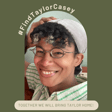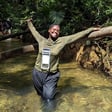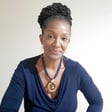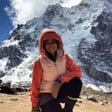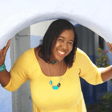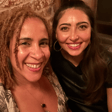Become a Creator today!Start creating today - Share your story with the world!
Start for free
00:00:00
00:00:01

Fight or Flight? Black Women Moving and Living Abroad
Considering moving abroad after this U.S. election? Many Black women are interested in life outside of the United States but don't know where to start. Host Janna Zinzi interviews Raychelle Heath and Twanna A. Hines, who have lived outside of the U.S. and all over the world for many years, about what you should know about moving to another country, and how to thrive abroad!
Transcript
Introduction by Jana Zinze
00:00:01
Speaker
Welcome to Spirit in the Material World. I'm your host, Jana Zinze. I'm grateful to be here with you today. It's been many moons. You can also call me Jazz. I am a travel arts culture journalist, media strategist, and the owner of Wander Women Travels, which is a guide that highlights cultural and sustainable travels and centers Black women and women and gender expansive folks of color.
Why are Black women considering moving abroad?
00:00:28
Speaker
I envision this space as an audible eat, pray, love, but with a lot more flavor. So think Old Bay, Shea Butter, and Frankincense. While I've been really plotting to do this reboot all year, I was inspired to finally kick this off with a conversation that's been popping off after these devastating United States election results.
Meet the Guests: Rachelle Heath & Tawana Hines
00:00:52
Speaker
Black women especially are looking to leave the United States and seek greener pastures or blacker beaches
00:00:58
Speaker
outside of the country and so I've been getting a little grumpy ah online seeing a lot of the conversations that are very flippant about what it means to move to another country and of course because it's social media folks are selling big dreams and courses and all the things without acknowledging the realities.
00:01:18
Speaker
So I could not think of two better people to interview today about being Black women living abroad. Let's talk about the highs, the lows, what you should know, ah you know, if or you consider to move.
00:01:33
Speaker
So I've known these beautiful, beautiful beings for over a decade and then some, and I'm so happy that they are here with me today. We have Rachelle Heath, also known as Ray, currently in Costa Rica, but originally from South Carolina.
00:01:51
Speaker
And um she has an amazing podcast called Black Women in Wellness. So definitely check that out. There's a deep catalog of meaningful content. um And she's also a brilliant writer, poet, creative. I have her art in the background. um So I have to shout that out.
00:02:10
Speaker
And also in the room is Tawana A. Hines from Chicago, but living in Almada, Portugal. She's a founder and entrepreneur of a black woman owned small business that helps nonprofits and businesses achieve financial stability. Welcome, welcome y'all. Hey, thanks for having me. It's wonderful. Happy to be here.
00:02:34
Speaker
So happy you are here and have this conversation at this time right now. I'm sure you've been seeing a lot of chatter and people probably hitting you up like, how do I get out the US? Should I do it? What does this look like?
Rachelle's Expat Journey
00:02:50
Speaker
So Ray, I want to start with you. You've been living outside the US since the mid 2000s. So you're like the OG of this situation, of this game here. Yeah, I guess I am. You're the one I talk about. It's wilder because for that long, yeah. I'll be like my friend Ray. She's been outside since W came into the office. So I'm wondering, can you share a bit about the changes that you've seen in the US expat immigrant
00:03:24
Speaker
community, what that's been looking like, um and how has it been living outside of the U.S. for most of your adult life? How has that, you know, shaped you? um Yeah, tell us a little bit about that experience. Yeah, so, ah you know, it's funny when I left back in 2007, people were a lot quieter about it.
00:03:46
Speaker
So um I think the big thing that I've seen change is just this explosion on social media of people needing to um share, which I think can be a double edged sword. um I also feel like, you know, we had a We had access to information back in two thousand and seven but it was different you know i was still walking around with lonely planet and photos guides um and hoping that the maps were up to date um and now you know we can go online and get up to date information so i think there's.
00:04:20
Speaker
There's so many amazing resources, but there's also a lot of hype. And I think anyone, I know we haven't gotten to that question yet, but I think anyone who's looking to go abroad, um and use your discernment.
00:04:36
Speaker
when you're in checking out what you see online because a lot of it is to sell you something or to sell you a lifestyle and not necessarily to tell you the truth about what it means to actually leave the country. um i I left very intentionally and I left to work abroad so um I was in Maybe a different situation than a lot of other folks I was going with the work visa I was going to be working at I was a public school teacher for I have been a public school teacher for most of my time abroad. I'm working with a private company now but um
00:05:12
Speaker
You know, a lot of the work to get abroad was done for me, and a lot of the cultural education that's so beautiful about being abroad was made easy for me to have access to. um And what I learned is that there are lots of other ways to exist in communities. There's lots of other ways to govern. There's lots of other ways to treat people. That racism doesn't have to be the default. That as a woman, I don't have to live in fear in this body. There are communities that still value people who look like me.
00:05:42
Speaker
um And that those were helpful lessons to learn. um And i I think my kind of of resoluteness about continuing to travel and be abroad as I'm entering my my mid-40s has a lot to do with that level of safety and also that level of value. um And ah recently someone said to me, which I thought was really out of pocket because They don't really know me. They said, you know, well, being in Costa Rica isn't going to save you. And I was like, I know that racism exists everywhere. I'm still black. um But what I know is that the level of violence that is associated with that prejudice is incredibly diminished once you leave the United States. um At least that has been my experience. um So that was a very rambling answer to your question.
00:06:39
Speaker
No, i'll believe it that was rich. No, that was great. That was great. That was super helpful. I really appreciate what you were saying about the idea of learning about ways to be in community and like governance um and really being able to experience that. um Those differences because being here a lot of the time, you know, you just get in it. You're stuck. You're in this. And like this just seems like the entire world, it is your entire world, if you're not you know able to travel or know if you're bogged down in like the day-to-day realities of navigating these systems here in the United States. Now, I wanna build on that a bit with with you, Talana. You've been on a journey to gain residency and also learning Portuguese.
Why Choose Portugal? Tawana's Perspective
00:07:31
Speaker
That's been really cool to watch your journey with that. I love it.
00:07:35
Speaker
um Can you share a bit a bit about what brought you to Portugal um and like what that experience has been? Just like, again, getting acclimated and and being a part of community and maybe if there's any lessons that you've seen about what it's like building community out there. There's so much. I didn't even know where to start with that.
00:07:57
Speaker
It's so good. I'll start by saying my time in Portugal is my third time living abroad. And so I went to the UK in the late 90s. I was in Amsterdam and the Netherlands in the early aughts. And now I'm here in Portugal. I arrived here in 2021. So this is my third year living here in Portugal. I decided to come to, actually didn't decide to come to Portugal I decided to live abroad and I prioritized what's important to me and picked a place that matched those priorities. So it was January 6th, I was living in Washington DC, January 6th, 2021. And I remember, I mean, if we close our eyes and rewind to what that time was like, we had just been locked in our homes for about a year. So that's a year of not entering funerals.
00:08:47
Speaker
not having birthdays in person with friends that we love, not being able to fly in airplanes and travel, do things that we might be used to. Like for a lot of us that we're actually like believing that COVID is real and trying to keep ourselves from getting it, our lives change drastically.
00:09:04
Speaker
in 2020 early 2021. So I was already in a different mental state at that point as we all were in some way or another, right? So then I'm sitting there in Washington DC and a lot of the ways in which the news gets reported about the insurrection, people storming the Capitol.
00:09:24
Speaker
It's reported almost as if they teleported in and left, as if the people who were living in the DMV didn't have to live with the people who had come in town from that before, during, and after, as if they weren't at the grocery stores with us, riding the trains with us, as if we weren't literally locked in our homes because they put the city in a curfew. Everybody get off the streets. And there was a military response to that. There were police. There were helicopters. We saw planes. and And it was just like, this is too much. This is too much. Before the end of this year, I am leaving the United States. I decided first, as I mentioned, I'm leaving the United States.
00:10:07
Speaker
That's a point I often give people. People reach out to me. Portugal's really popular right now. They'll say, hey, I'm thinking of coming to Portugal. What do you suggest? And I'll say, I think you should pick the place that fits best for you. That might be Portugal. That might not be Portugal. I love it here, but I may not like another place just as much.
Representation & Community Abroad
00:10:27
Speaker
That's not going to get to that other place. It's just you've got to know, what are your goals for getting abroad? What's important to you as a human being?
00:10:36
Speaker
I need beaches. I need water. I need the ability to travel for fairly low cost to nearby countries without the need of another visa. I have several things that I need to have access to. And so I started with what do I want? What do I need? What makes me feel safe? What makes me feel secure? What makes me feel loved? Wrote all of that stuff down and really started looking for what are the countries I can offer that to me? For example,
00:11:05
Speaker
I've struggled with anxiety, depression, all kinds of things throughout my life, and that doesn't mean that it's like, oh, people say that. You hide it well. No, I don't. I manage it. I manage that just like you'd have to manage anything else in your life, ADHD, what have you. One of the things is knowing what my triggers are. What are the things that make me feel sad?
00:11:26
Speaker
I cannot live in a place that is gray, rainy, and cold. I was not going to return to the UK. I was not going to return to Amsterdam, as lovely as both of those places were. I literally Googled places in the world with the most sunny days. I Googled who has the best weather. I Googled the kinds of things that I know are important to me.
00:11:50
Speaker
Fortunately, it's 300 sunny days a year on average. I was like, that sounds good. And so there were just other things like that that I was like, what's going to make me feel good in the place that I live? So I would say that's my biggest tip for people who are thinking about whether or not they should live abroad. Number one, don't pick a place and then try and jam your life into that because wherever you go, as they say, there you are. If you're the kind of person who meets with your family every Sunday and you all get together and you all have dinner and things like that, moving 3,000 miles away is probably not the best thing for you, right? You may come home. A lot of these influencers aren't telling you the number of people who move to these countries and then move their asses right back home. Not everybody who comes abroad stays abroad. And so really think about what do you actually need to do that?
00:12:40
Speaker
The other thing I want to touch on and then open the floor for other stuff that we want to get on. ah You mentioned in the beginning you said something about like black people thinking about black women, thinking about going abroad, what we might encounter there, things like that. I always love reminding people we are the global majority.
00:12:59
Speaker
And so when people ask me things like, oh, you know, I wonder if they're going to be black people in the country that I'm going, I'm like, there are black people in the United States of America. And so as we think about, will there be people who look like me? And for those of you may who may be listening to this and not viewing this, I am a dark, chocolate brown skinned woman. And so people aren't going to mistake me necessarily. of this Is she South Asian? Is she Moroccan? Like the color of my skin tags.
00:13:30
Speaker
African diaspora, and a lot of ways that people from different skin shades may not, right? And so when I was thinking about going to the world and where I wanted to be, I could never make my home a place where people didn't consider people who look like me as residents, as citizens, as people who make that their home.
00:13:50
Speaker
And so again, it's like we're everywhere, but the degree to which we all look like is very different. We don't want, we look a million different shades, everything from milky white to that deep dark chocolate delicious hot cocoa, right? Brown. And so like even that, as if you think of just like being a black person in the world, how you're clocked and identified.
00:14:13
Speaker
as a black person varies based on what you look like, right? So there's just a lot of things and what we've talked about so far. So those were two. One, pick what you need and what you want and what feeds you. Let the country follow. Two, as we think about black women abroad, women were everywhere. And then we don't all look, think, act, believe in the same ways.
00:14:36
Speaker
Yeah, i just I just want to second a lot of what you said, because so we're everywhere. the The diaspora is wide and deep. um And i I have heard quite a few black people say, I want to go where there are black people. And you're going to go where there are people from the African diaspora.
00:14:53
Speaker
you're not going to go where there are Black people. And your your cultural context is beautiful and rich, but if your reason for wanting to go somewhere is because there are people who look like you, and I'm using air quotes, you're probably going to be disappointed when those people either speak Portuguese or Spanish or some other language that you don't speak and have a completely different cultural context than you and look at you as an American. I think we're so often clocked in the United States as other which is I'm gonna say it fucked up because it's the only country we got most of us um that many of us don't associate as being American that's that's adjacent to whiteness but when you leave the United States you are American um and you travel with all of the same privileges as anybody else with that blue passport
00:15:47
Speaker
And so your connection to that person is going to be built the same way you build any other relationships. And it's not because you look similar. It's because you're really doing the work to build those relationships. um I just wanted to to add that. Yeah, definitely. I agree. Thank you for saying that. um you know that was you and I were together actually you mentioned January 6th Tawana uh Ray and I were together we I was living in the same building uh with her in Costa Rica when that happened and we were like uh yo
00:16:25
Speaker
Are you watching this? I don't know if you called me or I called you or we went into each other's rooms. And we were just like, yo, what is going on? And I promise you, let me tell you, I was living um in Playa Zococo in the same town as Ray.
00:16:42
Speaker
At that time I had gotten there December 2020 after leaving Los Angeles. And I came to New Orleans for a little bit. And to me it was like when I said I was like New Orleans is my last stop in the United States, like this the only place I want to be in the United States, any like if it's not New Orleans.
00:17:00
Speaker
I'm out. And um like housing was real funky at that time because everybody was trying to capitalize on you know COVID, everybody being desperate and like throwing money at housing. And I was like, I'm not the one. So I ended up with Ray in Costa Rica. And January 6, I'm going to tell
Jana's Costa Rica Experience
00:17:21
Speaker
you, on January 7, it might have even been January 6, I booked an additional three months In Costa Rica, I was like, Oh, y'all are a wallet up there. No, and then ended up moving to the Caribbean coast where I ended up staying for like on and off for another like nine months. I was yeah like the rest of that year the rest of 2021, and um
00:17:44
Speaker
It's exactly what you were both saying about there was, I had a desire, and I know there's a lot of other, there's a huge black American expat community there, um which is really beautiful, is really beautiful space. And also there, one of the biggest lessons was I think that people overall were learning is that like, yes, there's this desire to be around um you know other black folks other folks from the diaspora it's one of the reasons why i love it there you know but at the same time i will tell you ray i was with you when we saw the confederate flag was maybe my third day implies el coco it was on some dude's bike and
00:18:27
Speaker
this last time I was just there I was staying across the street or across the like dirt road from a guy who had a don't tread on me flag and this is in the Caribbean coast and I'm like so you chose to live here amongst black folks and black as a broad term and have that flag, right? So anyway, I say all that to say that one of the bigger kind of things that have been, I think navigated more. One of the biggest realizations that people were having is that, yes, you can move to a ah place where there's folks from the diaspora, but you're looked at as an American. They're looking at you like, you still, you, I want to say you a gentrifier, but I'm gonna say it. You know what I mean? Like there's,
00:19:12
Speaker
things where the prices go up or we have American dollars and passport privilege and culturally things are different um and there's still those diasporic connections right because that's just those those are like DNA and like cultural things that we have that cannot be taken away but the realities are a lot of our lives are so different and so it really required a lot of intentional community building And, um you know, I lift up a lot of the folks there who were really serious about that. yeah One of my friends, shout out to Sadie Jordan, who runs Soul Life Travel, who really was like one of the first people who I met that was really like
00:19:53
Speaker
very intentionable intentional about bridging like African Americans or Black Americans or Black Europeans and the Afro Costa Rican communities so that it wasn't like this. I don't even want to say tension, but a blindness, I would say, I think on the part of a lot of the you know Black expat immigrant folks who had moved there. So I think what you're saying is so is beautifully said um that it's kind of all coming back to community, right? And how you, you know, build community. So I'm wondering, do you have any um going off script?
00:20:36
Speaker
and many questions one of us you know what i do we're gonna freestyle I mean,
00:20:43
Speaker
i mean listen, if you want to go in on that, do it because what I was going to ask, and I think that it is actually connected is. What have been some of the best maybe lessons or best ways that you have been able to build community in different places so like you to want to in Portugal, right you've lived in so many places right you've lived in the Marshall Islands, Mexico, you ended up in Costa Rica kind of by accident, you know, so what is What does community building look like, especially when I think as these conversations about post-election life is are happening here in the U.S., we're talking a lot about this idea of community building and mutual aid and analog time. So I'm curious what that looks like in the context for you being in spaces that were, you know, where you moved into these new new locations and new communities. Well, new to you, you know? Yeah.
00:21:37
Speaker
Do you want to take that first, right? Yeah, my first thought is you have to stop centering yourself. I think we oftentimes move in a way that the world revolves around me and all of my needs are priority number one, right? Not saying that that's an incorrect way of thinking. You got to take care of yourself.
00:22:04
Speaker
But when you move to another country, you're a visitor, you're a visitor and you're there because they've decided, you know what, you seem like you're going to treat our our space nicely. So come on in, come on in and enjoy what we have to offer, right? But if you move into that space in a way where you're centering yourself, it becomes about all of the things that you want, you need, and also your pain because folks that are talking about leaving the states right now are talking about leaving because they're in pain. They've been hurt in a way by this new shift in government that that feels like it's not something they want to support anymore. But that other country is not responsible for your pain. That's something that you have to work through on your own.
00:22:54
Speaker
So if you go into a space understanding one that you're a visitor, understanding two that you're not you're not the center here, you're coming in at the, you know, grace of this country. And then also to come in with curiosity, you know, like, I think you're right to wonder that if someone is moving somewhere, you need to prioritize your needs first and go somewhere that's going to meet those needs. um But also, you know, have curiosity about where you're going to be.
00:23:23
Speaker
about learning the language, about learning the culture. I love taking classes when I go to new places because it's a wonderful way to meet people, but it's also a wonderful way to really connect with the local culture. um Don't spend all of your time with people from your country. If you left your country, it was because you hopefully had some curiosity outside of just wanting to leave your country. So how do you connect with local people? um Going to local businesses. Give your money to people who are from that country. um Like I said, taking classes, meeting people. Go to the gym if you're someone who enjoys exercise. um So those are some of my thoughts about how to build community. But I think the key is
00:24:08
Speaker
you You have to move away from centering yourself. and hey I love that, and that's so true. I think I agree with all of that. I love that. I'm just sitting here soaking that in because I was like, oh my gosh, that's so beautiful about that, right? Oh, what would I add to that? I would say just turning the language and turn the dial up, you did more, and something you put up is language. Absolutely learning the language of wherever you go.
00:24:35
Speaker
um I think it only harms, I think as a visitor, and I love that word that you said you are a visitor, so I'm going to use that I think um for the rest of this conversation as a visitor, right? Like as a visitor in that country,
00:24:52
Speaker
It's easy to feel alone or isolated or outside or I'm hearing this noise around me that's just like white noise because I don't know what these words are. I don't know where one word stops and the next one ends. It's just a string of sound.
00:25:11
Speaker
called a language that I don't know that I understand. And so for me, learning the language was the number one thing that has made me feel um like I'm a welcome visitor and that I'm a visitor who can understand the world that's going on around me.
00:25:29
Speaker
I think I speak Dutch fluently because I didn't before I moved to the Netherlands, but I sure as shit learned it. And I speak Portuguese now because I didn't speak it before I moved here, but I sure as shit took classes and learned it. And I think that so much of it for me was when I go abroad, I have chosen using as even as a visitor to make that place my home.
00:25:52
Speaker
I have a lease, and by name, that is more than likely in the local language, yet another reason to learn a language, right? You'll be signing shit. And language is that you may not know. Google Translate can only pull you so far, right? And so I knew that I wanted to learn a language, and that's been such a big and important part of feeling community.
00:26:13
Speaker
I never felt like I could feel at home with A, like I said, people around me don't look like me. And B, if I can't speak the language of people around me, speak. And so that's really how, here people walk, because there are people from Angola, Cape Baird, Black rights people, there's people from everywhere here, right? And so people walk up to me and just start speaking Portuguese. They assume, obviously she speaks Portuguese, she lives here. And so they just speak to me in Portuguese and now at this point I can't speak um back with them.
00:26:39
Speaker
in Portuguese but I would say absolutely learn the language because to pay at those businesses right even if it's the very basics of hi I would like just learning that right and thank you to be able to do that just the smiles and the warmth and the acceptance that comes in when you de-center yourself as you say and their language may not be one that's familiar with you. So I think that's so important. And then on the mental health aspect, so much, and I was talking to a friend about this just today, I was like, I feel like I had an armor on in the United States, like an actual armor, like this emotional armor.
00:27:23
Speaker
to keep myself safe. um Some of it's childhood stuff of not having safety and adult survivor child abuse, which I'm very open about, because so many of us aren't, don't talk about that, right? So that, right, that armor of just like having this sense of safety of the people around me. So when you move to another country, you have to rely on strangers and trust them of what they're telling you, whether it's directions or getting in the car with them to go there or signing that lease and that, you're trusting a lot of people who you know nothing about and that they know that you're in a position where you don't have that strong social network that you would have and all of these things. And so I had all of these things that just kind of like that armor when I first came here was just like, oh, you know, like, can I make it metal? Can I make it an actual armor? Right. there So all these mental health things that I needed to work on of just kind of like, what does safety mean to
00:28:21
Speaker
me? What does trust mean to me?
Mental Health & Personal Growth Abroad
00:28:25
Speaker
Outside of a physical place with walls or these arbitrary lines we call borders, what does home mean to me? What did home look like growing up? What do I need to feel that a place is home? And so I think in addition to the language, which is just a verbalization of being able to have community and fellowship with others, I think there's so much in a mental aspect that's underneath that of what does trusting and being communicated with and relationships look like for us? And we all have ourself to work through. And there are a lot of toxic ass people who bring their toxic ass self to another country and bring that toxicness with them. And so if you're someone who comes over and you see this as a time to really like heal in a lot of ways, right? And to say, where are those places where I am putting up armor?
00:29:16
Speaker
And what does it look like for me to start taking some of that stuff off? See all the time, it's cutting apart and like, is it safe? And everyone here is like, Portugal is so much safer than the United States. True, also, safety is a state of mind. You can live in the quote, quote safest place, but it can feel unsafe for all sorts of triggers. Walking home tipsy at 3 p.m. and cutting through a park. My Portuguese friends say, oh, it's fine. I won't feel safe, even if it is, right? And so all these things that we need to kind of unpack with that.
00:29:49
Speaker
Yeah. I love that. Go ahead, right? You're about to jump in. No, I was just going to say, as I was listening to you talk, it just, I think it comes back to the fact that you bring yourself everywhere you go. These places that we're moving to don't owe us anything. And I know that sounds really harsh, but if you're in pain, you're going to be in pain no matter where you go, and no one is responsible for your pain but you.
00:30:16
Speaker
And so I think it's really important. I love that you brought up the issue of mental health. I think it's really important for us to understand what we need to heal and that it has absolutely nothing to do with where our physical bodies are located.
00:30:31
Speaker
Yes. And I think, no, thank you for that. I think the mental health piece is really important, especially in this time where, you know, as we talked about, folks are moving because of a fear response or considering moving, you know, as in a and fear response. And um there's a difference between like feeling like i have to get out of here right like that's like fight or flight versus i'm actively choosing to go somewhere because i know i want to explore something different have a different experience get out of dodge you know like whatever those reasons are and you know i think one of the things for me that was very confronting
00:31:13
Speaker
about living in other places particularly I would say when I lived in um Costa Rica was like really having to sit with myself and my own stuff you know and we were kind of in that process of doing that during because of the the pandemic anyway where it was like we have a lot of alone time um you know but when you're out of your comfortable context is when it's like you really kind of see what you're made of you know like there's something to be said about some level of safety or a level of comfort. like As much as the US has its mess, trashy systems, certain things, whatever, there's it's comfortable because it's what we know. So we know how generally to navigate systems, even if they're not working for us, right? um So it's like the things like, even when you're like, oh, I gotta go get the gas turned on, or like, I need to go mail this letter, or like, how do I get water today? you know Certain things.
00:32:12
Speaker
That's the stuff that I think really tends to like kind of test you a bit in terms of living you know outside of the United States. and They may seem like very simple mundane day-to-day things, but that is a lot of the times where for myself, I found of like, okay, why am I like being pissy pants about this? Or like, you know, like, what is, what is this activating in me where I'm getting irritated or, you know, frustrated?
00:32:42
Speaker
um You know, and also I think being in solitude in that times, those times where you are kind of finding community and building community. And, you know, like you said, Tawana, like these trust issues, right, of like, how do I show up in community and trust people? You know, who is trustworthy? Who are my people here? um And that is a process and requires a lot of like intentional self-discovery and like asking yourself tough questions and really you know being okay with being in your feelings um and also navigating what you said is like understanding these are my triggers and like how can I deal with them in a context that's entirely new. I may not have my usual go-to things or places or people
00:33:32
Speaker
that i lean on and depend on and so i just i think it's it's really interesting to talk about this mental health piece because exactly like you said right you take yourself wherever you are and i think part of why this having this conversation was so important to me is that i think that gets left out of the conversation it's like these are these like quick fixes so just like Again, fight or flight is a response from trauma and from like being triggered.
Gentrification's Impact
00:34:01
Speaker
And so I think that's exactly what I'm seeing in the conversations online reflected is like that trigger and it's like, oh, I'm out. um And not to say that that's not a good decision, like move because you want to, but
00:34:16
Speaker
fundamentally making decisions from a place of love as ah as opposed to a place of fear. So I'm really grateful that you lifted that up. And so I'm wondering, you know, what are some of the, I was going to ask, what are some of the biggest challenges that you faced? But I also, I know Ray, we talk about gentrification a lot, and I think that would be you know, useful and I think a helpful context that's like not, ah not a lot of people talk about that. And I'm sure Tawana, you have, you know, um have experienced that in Portugal with like this, you know, huge rush of folks moving to Portugal. My mom even was like, so we, I think we could go to Portugal. And I was like, what you know about Portugal, mom? Okay.
00:35:02
Speaker
like because like two of her one of her friends is like that's where we're going when like everything goes to you know whatever so I'm just curious about um you know and I live in New Orleans right so like Every city that I've lived in has experienced gentrification, which really strips the culture. So much of the beauty or challenges, you know, disperses the beauty of our spaces. So I'm just curious what that, you know, looks like as an experience living outside of the US and also being
00:35:34
Speaker
you know, an American or someone from the States in these places where there may be pushback or resentment or maybe like they're just like, yes, rolling out the red carpet for you. So curious what those experiences have been like and what you've seen. How that's changed the places that you live.
00:35:53
Speaker
Yeah, I'm i'm happy to to jump in here because i I feel like I've watched two places that I love very much, Isla Mujeres and um this little town that I'm in in Costa Rica um just change overnight. It feels like overnight it's been um the course of years but I think When folks leave because they want to leave and not because they want to come to a particular country, there's a level of expectation, right? So I want to have a house that looks just like the house I had in the States, and I want to have all of the amenities that are just like the things I had in the States.
00:36:31
Speaker
And many times when you're coming into these markets in Central America, you're going to get it at a lower cost. So you you might feel like you can splash out a little bit more. And that's not the case now because gentrification, but, you know, at the outset, possibly.
00:36:47
Speaker
And the thing that people come to Costa Rica for and a lot of, um and people came to Istanbul for as well it was a natural beauty, right? And then it all gets chopped down because we want to build a three-story house that has a pool and a cabana and ah ocean views everywhere. um And then, you know,
00:37:12
Speaker
Gosh, there's so many things that I want to say, but I think what i I really wish that people would consider when they're moving is, do you want to be the person in the house on the hill that has all of the luxuries and you know is just living it up at the expense of the locals? Or do you want to be someone who lives in that place and is a really part of the community? and and I think that they're two very different experiences.
00:37:39
Speaker
um Drentrification is inevitable anytime someplace has a lot of good press and right now Portugal has a lot of good press. Costa Rica has a lot of good press. Everybody wants to move here. I'm using air quotes because usually after a about six months they don't want to move here. They just realize they wanted affordable housing for a little while or to get away. But the the mess that you leave behind is still here.
00:38:02
Speaker
um There are towns near me where the locals can no longer afford to live in the town where they work. They have to take a long bus ride to get there. um And it's because of gentrification.
00:38:14
Speaker
there are displaced wildlife here um and it's because of gentrification. And I think there are also quite a few people who are selling their land because gentrification also has a tendency to bring in an an element, an outside element that doesn't have as much care for the town because they're not from there. They're there to take advantage of the town so it changes the level of safety in a place. it's It's interesting and I kind of feel like I'm rambling but I'm gonna finish my thought here. It's interesting because the folks that come in and they build these luxurious homes and they have these you know demands for imported goods and you know they want things to be like where they're from, those same people come here because of natural beauty and safety and it goes away when they start making those demands is where i'll I'll leave it at that.
00:39:12
Speaker
It's well said. It's a huge one. I think whenever there's any conversation about gentrification, I like starting by saying, we'll have to define what that actually means. Because humans aren't invasive
Living Authentically Without Displacement
00:39:24
Speaker
right? And so we got to start there. And then we're just as migratory, if not as birds. And so as we think of like not only like where we're from, where our people are from, where those ancestors come from, we've all, as a human race, have moved and migrated and gone to different places.
00:39:42
Speaker
So when we talk about gentrification, I always start and say, well, we've got to think about what do we actually mean by that and not assume that we're all starting at the same starting point. So that's the first one. And then the other thing that I think, about you're right. Like, I mean.
00:39:54
Speaker
That's a global phenomenon. Portugal where, and I can pull up the stat if you ah later, we can talk about like, if you want it in the line or note type of thing description or whatever specific statistics on how radically things have changed. So for example, about half of Portuguese people earn.
00:40:14
Speaker
the equivalent of $1,000 or less per month. And so then when you have someone coming in from Berlin or Amsterdam or in London or New York or any of these, they're like, whoa, I can get a fat ass pad for only 1800. Amazing. I was paying double that. her I was paying that in the US, s but I had a one bedroom. Now I can get like a house. And so people are kind of like leveling up, right? Based on the cost of living.
00:40:40
Speaker
being drastically different for where they are. And that pushes people out, right? And so that's happening in Portugal for sure. ah The cost of renting an apartment in Lisbon is some of the highest in the whole of the EU, while the local wages are some of the lowest.
00:40:56
Speaker
It costs more to rent an apartment here in Lisbon than in Rome, for example. And this is a country of 10 million, not a city. The entire country of Portugal has about 10 million inhabitants. And so it's not a big city in Lisbon and Porto de Algarve. Not big in the same way that they have in the US. So when you get such a sudden influx of people from all over, right? It's a kind of way about that. And so as visitors, we can't vote in a lot of ways. And as visitors,
00:41:25
Speaker
for pushing out local people, there starts to be a shift of the geopolitical views of what it's like that, you know? So it all goes back to the, like, as a visitor and you come, like, what's your goal? What are you trying to do? Are you learning the language? Are you choosing to live in a kind of place? I actually don't live in Lisbon proper.
00:41:45
Speaker
I live in Almada. My first year I lived in Lisbon because I wanted, I was, my entire life was being upended as it is when you move abroad to another country, right? The grocery stores are different, the food are different, language might be different, everything's different. And so I wanted to be in a very central location place where it's easy to get around, they have a metro and a car, just basic ass stuff, right? So my very first year I lived in Lisbon proper.
00:42:11
Speaker
After a while, I was like, all right, done with the tourists, done with this. And I moved into a little local village where everybody around me speaks Portuguese. And if you ask them, hey, ah do you speak English? They'll say no. And so it's very much like I live in a smaller local community. I go to the local school up the street in my neighborhood to take Portuguese classes.
00:42:31
Speaker
when I go to the battery at the bakery, um they know my name and they could tell, they tell me, your Portuguese is improving. Because I've been going there for a year and a half now. And so they knew me when I can only say basic stuff, now I can ask about the plate of day. Oh, I'd like salmon better than this. Oh, your Portuguese has gotten better. And so it's nice when you're there, it's like, so not only if you don't want to be part of the gentrification problem, right? When defining what that means to thinking of like, how can you not be part of that?
00:43:00
Speaker
how can you make things better, right? And the choices, not only like how you live, there where you live, all of these kinds of things. like That's other than you tell people too when they're coming thinking of going to another country. If I say Italy, you can name at least two towns probably there, right? There are more than two towns in Italy. And so as we think of these countries that we want to go to, it would be like someone who's not from the U.S. saying, I want to go to the U.S. and I can only live in New York. There are a lot of Americans who don't fucking like New York.
00:43:30
Speaker
you know There are a lot of Americans who don't like Mississippi, or don't like California, or don't like Idaho. All of those places are extremely different. And so you might like that country, but not the city that you went to visit when you came for a two week scouting trip. And so as we also think of gentrification too, it's like Sydney, Lisbon, Rome, Accra, these are not the only cities in the planet. And so also thinking more holistically about if you're thinking of moving to another country,
00:44:01
Speaker
Think about the non-major city. One, the cost of living won't be as high. You won't be pushing people out because there's not as much of many people moving, right? There are way more people moving into Lisbon than there are Tomar. People don't know what the fuck Tomar is, right? And so it's like going to a smaller town, too, they don't have buildings or pools or all this. You're going to live in a more authentic local place, and you're not going to be displacing people as much.
00:44:26
Speaker
So you can also think of it as turns that even know if you are moving as an American, American salary and all of these things, you want to live like a local, you can pick a local community to live in.
Advice on Relocation Decisions
00:44:36
Speaker
Yeah, but i I just want to add, if you are going to live in a local community, integrate, yeah integrate, integrate, integrate.
00:44:48
Speaker
Because if if you're going in and you're you're disturbing that local community, then then we're still gentrifying. we're We're still power to the problem. um The other thing I think we haven't talked about, but you don't have to leave forever. like If you're really considering leaving, maybe do a month, maybe do two months, maybe do three months.
00:45:11
Speaker
Try it out. You know, some folks that are talking about leaving have never moved, period. Moving is hard, even if you're moving to another city, another state, and you're adding a level of difficulty to moving that you're not quite prepared for. So maybe just try it out. Pack a bag for a month.
00:45:32
Speaker
And see how you feel. thousand total yeah And that actually do have the static that just wrote about it. 58, according to the U S census Bureau, 58% of Americans live in the same state where they were born. And so if that's the majority, right? The majority of Americans live in the exact same state where they were born.
00:45:54
Speaker
So if you're, if that's you and you're like, I'm about to move to another country, it would be hard for you to move from pure Illinois to Palo Alto, California. The culture is different. The food's different. The way in which you navigate your roads are different. Whether or not you need a car, like all of these things are drastically different and that's in your same country. And so if you think about moving abroad, like it's going to be quite a change.
00:46:23
Speaker
And that's before you layer in visas and immigration and all of that. I'm just talking about being there, existing there. And another country is very different from being in your own place where you're from. Yes, that's been one of the biggest things. I will also say, though, you you can do it because I lived in South Carolina my whole life. And when I decided to move, I moved to a remote island in the middle of the Pacific that was two days away by plane. However, it's because I wanted that.
00:46:52
Speaker
and I was prepared to deal with whatever I was coming up against. um And I think that comes back to what you were saying, Jana, leaving because you want to go somewhere, as opposed to that fight or flight response. Definitely. I love so much of what you said, both of you. One, just moving as a New Yorker, I feel like we're a little bit spoiled in the sense of like every time I move somewhere, i'm like I have to undo another layer of like New Yorker energy.
00:47:18
Speaker
ah Shout out to me for this process of working on it, um but still maintaining my accent. Thank you very much. um But, um you know, even moving from like l LA to New Orleans or New York to New Orleans or other places that I've lived, you know, Costa Rica, Ray and I were neighbors when I first left the country for real, for real.
The Joys of Living Abroad
00:47:42
Speaker
um to like live for more than a month outside of the US. s I've lived next door to Ray. We were neighbors in Isla Mujeres. So I feel like you've been like my guide for a really long time. um And like someone who I've been able to be in community with who has been very like grounding for me is just experiencing life outside of the US, right? um and And what those changes are. But, you know, again, it's just like the reiteration of the community piece and like there's a piece also about humility, right? That's something that I feel
00:48:18
Speaker
being here in New Orleans, which is very different and distinct from the rest of the United States. And it's all it's it's like its own country in certain ways. ah Costa Rica has also prepared me for certain things in terms of like infrastructure and like how people move on Caribbean time, which I love that. And also, again, peel off your New York energy. like Calm down. um you know But I just think that I really hope that people will take these considerations and make these, you know, really think about these in personal ways and and really thinking about how to both set themselves up for success, right? And really being honest with themselves about what are my needs? Like for me,
00:49:03
Speaker
you know, leaving, I've left the country for like, it'll be months at a time here and there. And then I always end up coming back and then I leave again and it's, you know, whatever, it's this thing. um You know, because of when we talked about needs, I really do appreciate being close to family. Like that's really important for me to be ah close to family. But at the same time, I like to spend, you know, a month or two or whatever that is outside because I need a break.
00:49:30
Speaker
I need a break from the US. And to your point, Tawana, I don't do winter. So, mm-mm. Once it's below 60, I have an attitude. Even like 65, I'm like, mm-mm, that's cold. Like, I've been looking at the weather. I was like, 62, this is devastating. I'm like, we're just horrified, OK? Oh, my gosh.
00:49:53
Speaker
So spoiled. But, um you know, I think that it is really important for us to have those like self check-ins, but also, like you said, acknowledging that we are part of a community um and that to be humble when we show up in different places, to be curious, as you said, right, to come from like a learning space, a place, how can I be helpful? How can I be, you know, how can I observe and just kind of like,
00:50:19
Speaker
not stick myself into everything, not center ourselves. And then I do want to mention too, and then we'll we'll wrap up. I really appreciate what you shared, Tawana, about being comfortable in a place where you're like, oh, I look like I could be from here, right? And so and what that means for different ways across the African diaspora, right? so like depending on what I have on and now I don't have hair but when I had locks I would be clocked a different way than like people never know never know where I'm from it's usually not American unless I open my mouth but um and so it's just such an interesting the distinctions of like how skin tone and how like
00:51:03
Speaker
ideas of like who is who's American ideas of blackness um across the diaspora right and what that looks like in terms of how how you're received where in some places you know um as as an American like some places in Africa where we're white people you know what I mean more so probably me because my skin tone but even so knowing that you're an American there's that you know difference um And if I have my electes on, like my spiritual stuff, people are like, Brazil, Cuba, and always always it forever Puerto Rico. It don't matter where I am on this planet, someone's going to ask me if I am Puerto Rican. It does not matter. all it did In Mexico, this man stopped me. He was like the security guard at the museum.
00:51:51
Speaker
asked me if I was Puerto Rican. And I was like, sir, I'm in Mexico City. Why would you think? He was like, I lived in the Bronx. And I lived in the Bronx. I was like, yo, I love this guy. And also, this is absolutely wild. But anyway, I just say that to say, you know, finding comfort in being around people that look like us. I really appreciate us having those, really you bringing out the distinction of what that means. And like on a personal level, we may feel like that, but what does that, what does our presence mean in a community?
00:52:29
Speaker
where we may feel that, but there is some separation of like the realities of our existence as diaspora family and as diaspora cousins. um So I just wanted to bring that up. And the last thing that i went the last question I'm going to ask, because I want to i was inspired by your email today, Tawana, about joy and censoring joy. So I would love to ask you both What would you say are the most joyful things for you about living outside of the United States?
00:53:04
Speaker
This is such a hard one because there are so many things. Like I said, this is my third time doing this. So over the past 30 years, I've dipped in and out between Europe and the U.S. Well, thanks. It's hard to pick one. I'll just rapid fire say some of the things that I love. I love it that my grocery store doesn't consider it organic food if it doesn't have pesticides.
00:53:33
Speaker
I love it that the I actually am getting to see what the flavor of different vegetables and fruits actually tastes like when they're grown in the time that they need. I love it that ah the pace of Portugal, way except southern Europe, so the pace of things is just very, very different than the United States, that people actually stopped, my neighbor even talked to me and so forth and said, hey, so, and they'll start asking a question, and he says,
00:54:02
Speaker
Hola. Buon dia. Tudo me. Like just like the cut to the thing that we as Americans in general, right? Like that's not the way things work here. I love it that people sent your relationships first before anything else. Even your plumber, you're going to have a conversation with them in a way that you wouldn't in the United States. Um, I love that I feel because I tend to like seep into the cultures in which I live.
00:54:30
Speaker
People always, you said people think you're Puerto Rican. They always assume I'm from the colonies because I know where everything is. I get to know the place. So it was in the UK. People thought I was Jamaican. When I lived in the Netherlands and I put my mouth and spoke Dutch, we're like, oh, are your parents from Suriname? Here, people think I'm from Brazil because I speak Portuguese and I look the way that I look. And so sometimes if they like, they'll think, oh, did she from Brazil? It's like, no, I'm American. And so I love it that like, I'm able to seep in into A lot of different cultures and ways of seeing the world and be exposed to different ways of thinking that I may not even considered. Right. um I love learning different languages, because you learn different ways of
00:55:12
Speaker
ah thinking because people speak in the way that the brain works. And so the way that the grammar works, the languages that exist, Saudad, the words that exist in different languages that don't exist some in English. Portuguese and probably my ae my comprehension is good, my accent not as much. Saudad, I think it's pronounced, but it's this like longing, desire and hope. It's the the desire that the heart has after the thing is gone.
00:55:42
Speaker
And so there's no word for that in English in the same way. And that's beautiful. And Dutch, my favorite word was gzelech. And so it means a mixture of coziness, warmth, feeling like, oh, it's great or whatever.
00:55:56
Speaker
Because you can say, oh, I had a good time. But good time is kuzelik, means when all that, and you know that when you've been in that where it's like, it all just felt right, right? That whole just like, they have one word that captures exactly that feeling. And I love that because it's like the fact that those words exist means that there's an expectation that you live like that. That's why there's a word to describe it. So I love that too. And like, I can go on forever. I let it, like you say, I had done this,
00:56:24
Speaker
quite a bit now and I just love like existing in different cultures. yeah Thank you. Yeah, i you were talking about languages, and i I too absolutely love, love, love being able to learn new languages. When I was in the Marshall Islands, I was learning Marshallese, and I wasn't going to use it outside of the Marshall Islands, but it was a way to connect with people. And their word for hello is a lot like aloha in um Hawaiian, but it's yahweh, and it means hello, it means goodbye, but it also means I love you.
00:57:01
Speaker
um which I think is um really beautiful. It actually literally translates to, I love you, you're a rainbow. um when i When I think about yokwe, it kind of encompasses one of the joys of of being abroad, which is learning that there are different ways of thinking and and and and holding space for people. But I think also what brings me joy is that i I wake up every day feeling a sense of peace and safety that I don't know that I felt when I was in the the States. and you know
00:57:40
Speaker
i I grew up there and my family's there. I go back regularly. um But it's not the same kind of groundedness that I feel. Even when I'm on the road, I spent a year living out of a backpack and I was moving all the time. But there was no point where I felt like I was worried for my safety or I was worried for my things or, you know, I i felt like I had to hide myself.
00:58:10
Speaker
So I think that that's a great joy. I think it's a great joy to be able to go out in my yard and pick food. I pulled sweet potatoes out of the ground before I got on this call and it's fantastic. And I also get a great deal of joy knowing that there are people who will take this journey and open themselves up to new possibilities as well. And I know we talked a lot about gentrification and we talked a lot about fear.
00:58:37
Speaker
But there there are folks that are going to get to that point where they're like, you know, no, I actually want a different experience. And meeting those people on the road and seeing them open up to themselves is also a source of joy. And um yeah, that's that's really beautiful. And so i I do want to encourage people to try something new. And, you know, like I said, maybe don't hop on a plane and go a gazillion miles away the first trip. But, you know,
00:59:07
Speaker
Go and go by yourself. I've done all of my travel by myself. um And you know you you get to show up in a way that you you might not if you were with your you know best homegirl or you know your cousin. um And just learn. Learn about yourself. Learn about the world. It's a beautiful thing. That is so beautiful. I love so much. And it's perfect, too, because both of you are like language folks. So I was like, oh, this is great. um and And just sitting really with what you said and. um
00:59:41
Speaker
What I've been learning living back in the States and being in New Orleans, after I came back, it was always important for me to be like, how can I take some of those lessons? How can I like hold on to some of those feelings while I'm in this ridiculous, you know, context of the US that does, you know, it sucks you in, right? And you don't realize that I think until you like leave for amount of time and come back.
01:00:09
Speaker
um And so I never wanted to gate that and part of it is why I have this like tattoo you can't entirely see all of it, but ah was like, this is a reminder of my time in Costa Rica and nature and like the calm that I had. um and It was done by this really dope local woman tattoo artist. Shout out to Gabby Castro. I text her like randomly and be like, yo, I keep getting compliments on this tattoo. Like you bodied this. Thank you. like so So much love.
01:00:40
Speaker
She's so great. um And you know, but I just think about like, how do I maintain the joy within, right? And there were also really, there was a lot of challenges that I dealt with being ah living outside of the country at that time, just because of the space that I was in emotionally and you know again coming out of pandemic and so I love to hear this like the things that you love um and that bring you joy and for someone like myself it's like I've planted some different plants that I've seen in Costa Rica like they work here in this environment so I'm like yay like I can bring that here you know where things like
01:01:23
Speaker
even planting my Moringa trees or whatever it is, right? And like, you know, finding the joy in where we are while also still having that desire to explore. I know that this is, you know, that there's a big wide world out there, not just for me, but for all of us. And that I do feel like, and I've always felt like this, that travel and then by extension living in other places is really important for us to community build.
01:01:49
Speaker
both as folks within the diaspora but just as like people in general that I feel like we have similar kind of open heart space right and and a desire to want the world to be a better place and so it could not be more important to me um I think for us to like again really think about what does that community building mean as we travel as we you know maybe tiptoe into moving other places um and just as we're in community with with each other virtually um and sharing information that I think is helpful and that is grounded and um that is also joyful as well because we we need joy we need to cultivate it no matter what is happening in the world especially amongst us
01:02:35
Speaker
So I am just super grateful for this conversation, your time, your wisdom. um So just as we wrap up, can you just let folks know how to best find you to stay in touch, how they can, ah you know, engage with you in other ways besides this this podcast? Everywhere's funky brown chick, ah because that was an intense. I've been online since the 90s. And it was like three things about we will never change. I've moved a bunch.
01:03:02
Speaker
But I've always been a little bit perky, so funky. The color of my skin is brown. the word used to describe me as a black American woman is different depending on the country that I've lived in, because they didn't all speak English to, right? So that's like a big brown just to script it, right? And then chick, very femmy. And I'm cool with that. And we shouldn't deride people, trans men, trans women, anybody, non-binary people for choosing to gender express in a particular way, we tend to denigrate fens, right? Of any gender. And so like funky brown chick. And so you can find me online
01:03:36
Speaker
everywhere with that, TikTok, the website, everything. Because I'm also the founding CEO of a company, some of those platforms are for the firm, others are specifically for me, but you can find me via one of those. That's perfect.
01:03:50
Speaker
Yeah, I had to think about that because I have a tendency not to want to be found, but I do have a website. It's theracialheath.com. And I have a website for Black Women in Wellness, which is just blackwomeninwellness.com. I love it. I love it. Thank you so much for being here today with me. I know the conversation will continue and just so much gratitude and love for you. And I hope to see you IRL.
01:04:18
Speaker
Portugal, you're always welcome. Listen, I've never been. It's on the list. Come, come for my birthday. Yes, I've been told. It's on my list, too. Come for my birthday. Oh, look, we about to have a little water wait up in Portugal. Yes, we do. The theme is revolutionary joy, so come celebrate with me. Yes. See, I love that. This is, listen, we about to have a part two IRL.
01:04:50
Speaker
Tear it up the streets in community and enjoy it. I love it. Thank you again. This was spirit in the material world. And until next time, be joyful, be loving and love up on yourselves and each other.


